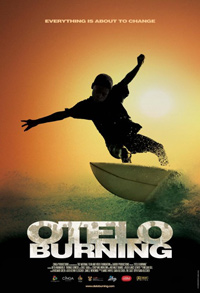Blecher Rides Waves, Inelegantly
 Cutting her teeth with the surfing 2010 short doc Surfing Soweto, director Sara Blecher has forged ahead, tackling similar territory with her fictional wave bound feature debut, Otelo Burning. Often feeling a bit puerile, films that fixate on surfing tend to use the sport as an over arching symbol of freedom and escape, and Blecher’s film is no different. A quartet of friends face a myriad of adolescent problems, only to find that surfing could be their ticket away from their issues to fame and fortune atop a gloriously blue break. It does however successfully employ the played out athletics to explore racial tensions and political unrest that plagued South Africa before the end of apartheid during the 90s with surprisingly grim inflection of tonal balance.
Cutting her teeth with the surfing 2010 short doc Surfing Soweto, director Sara Blecher has forged ahead, tackling similar territory with her fictional wave bound feature debut, Otelo Burning. Often feeling a bit puerile, films that fixate on surfing tend to use the sport as an over arching symbol of freedom and escape, and Blecher’s film is no different. A quartet of friends face a myriad of adolescent problems, only to find that surfing could be their ticket away from their issues to fame and fortune atop a gloriously blue break. It does however successfully employ the played out athletics to explore racial tensions and political unrest that plagued South Africa before the end of apartheid during the 90s with surprisingly grim inflection of tonal balance.
Blecher sets the familiar pieces in play with our dark skinned leading teens, Otelo (Jafta Mamabolo) and his little brother Ntwe (Tshepang Mohlomi) who are under the thumb of their widowered father who wants his sons to grow to take over his taxi business. Otelo’s best friend, New Year, acts as our narrator, much like Rocket had in the nonpareil City of God, wielding a camera gifted by a generous white man who ignores the lines of prejudice in favor of judging people on their character and ambition. The three boys find themselves in the midst of conflict between Inkatha hostel dwellers and township United Democratic Front comrades on the other, but while most townspeople are on their toes worrying about their own well-being, the three boys befriend a beach bum named Modise who introduces them to the joys of surfing after a local party. His wave bound abilities enthrall the kids and he quickly convinces them to borrow a board and hit the water. Subject to his father’s restriction from swimming due to a dream of him being killed by a snake in the deeps, Ntwe is left on the sidelines to watch while Otelo and New Year become supremely talented riders, catching South African pipes like the best of them.
With the little time he spends at home, Otelo starts to see New Year’s younger sister, Dezi, a love interest who has been under the eye of Modise for some time. Tensions between the boys lay under the surface, but Modise’s authenticity is called into question when he is exposed for lying about his place of residence. While firearms stream into the hands of rebels causing local violence to escalate, Otelo is asked by his father to watch his younger brother while he is at work, but when a local surfing competition gives him the opportunity to show his talents to the wealthy white community that could bring him sponsorship, he can’t pass on the potential and not surprisingly, his worst nightmares come to fruition with flame and gunfire.
Co-written by Blecher and James Whyle, the script offers up the best and worst moments of the film. Nimbly winding water sports with political drama, the narrative integrates the two opposing topics in generally subtle clips of involved relatives preparing for conflict, edited within a steady plot of beach bound glory. But while the overall story arch succeeds, dialogue often feels clumsy and overbearing coming out of the quartet of young boys, though it doesn’t seem due to poor performances. In this case, less could have definitely been more. Also, for a film that literally rides on the natural beauty of ocean waves and the naïve spirit of youth in revolt, the film is unusually drab. Shot by cinematographer Lance Gewer (known for the award winning Tsotsi), it suffers from overly shaky handheld compositions that don’t take full advantage of the real life backdrop which its archetypal characters inhibit, yet its exciting in-action waterlogged photography looks spectacular, if a little overused. The photo book themed credits and title cards that are supposedly pieced together by New Year are sadly the visual peaks of the picture.
As a debut full length, Otelo Burning does show promise in Blecher, but does not warrant more than mild enthusiasm. In its dark turns and racial probing the film manages to evoke heartfelt affliction and hope for a mildly better future we’ve come to already know, but its faults sorely outweigh its gratuities. Neither balls-out sports action or full-on political drama, Blecher’s feature occupies an awkward space as an occasionally insipid production of youth caught in turmoil.


